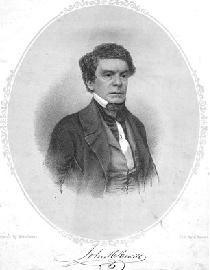
|
Home About This Site 'Gusta in the Wa'er Bibliography Contact Us
|
John David Walker
“A Mistake in Judgement” by Russell K. Brown
John David Walker lived most of his life in the shadow of
his older brother, but died when he was on his own.
John was born in Richmond County in 1825, the son of Freeman Walker and his wife, Mary. Freeman’s older son was William Henry Talbot Walker, the noted Augusta soldier.
At the start of the Mexican War in 1846, William was a captain in the U.S. Army. Encouraged by his brother's service, John, now twenty-one years old, went to Charleston, enlisted in the South Carolina Volunteer Regiment in what William called "a fancy company," and was soon promoted to first sergeant. The brothers met on the beach at Vera Cruz in March 1847.
At the battles of Contreras and Churubusco in August 1847, William was knocked down but not injured by a spent cannon ball rolling on the ground and John was shot through both thighs. The army doctors, fearing gangrene, wanted to amputate the young man's legs. William, who had much experience with wounds, intervened on his brother's behalf, the legs were spared, and John recovered.
In the 1850s, John went off to filibuster with General William Walker (no relation) in Nicaragua. In 1857, brother William bought Mobley Pond Plantation in Screven County. William acted as owner-manager and John was his overseer. By 1860 John had organized the local men around Mobley Pond as the Troup Light Infantry, which his brother referred to as "a company of minutemen."
When Georgia seceded from the Union, W.H.T. Walker was made colonel of one of the state's two regiments of infantry and John secured a captain's commission. After the two state regiments were merged into one, called the 1st Georgia Regulars, John David Walker became captain of Company C. In July 1861 he was elected major.
The Georgia Regulars arrived in Richmond only days after the First Battle of Manassas. They were assigned to Robert Toombs's Georgia brigade in General Joseph E. Johnston's Confederate army. Spring 1862 brought McClellan's Peninsula Campaign and the Seven Days' Battles. The Georgia Regulars saw action from Yorktown to Malvern Hill. When the fighting shifted to northern Virginia in August, John was at the head of his regiment, now in David R. Jones's brigade of Longstreet's corps. While General Jones temporarily commanded the division, Colonel George T. Anderson of the 11th Georgia led the brigade.
At Thoroughfare Gap, on August 28, 1862, as Longstreet's corps marched to Stonewall Jackson's support at Manassas Junction, the Confederates found the road blocked by Yankees. Jones’s division was ordered forward, Anderson's brigade in the lead. Federal artillery swept the defile while the unprotected Georgia troops pulled themselves over the rocks and through the bushes. Finally, the Regulars got within range and made their fire count; an enemy counterattack was repulsed. Walker won commendation from General Longstreet, who wrote, "The conduct of the 1st Georgia Regulars under Major Walker was distinguished and gallant." Colonel Anderson added, "The Regulars in this affair behaved with distinguished gallantry, as they have on every occasion, and I only regret that the [whole] army is not composed of just such men."
Two days later, the regiment went into action again at Second Manassas and Major Walker, still in command, was wounded in the leg. He was treated at a field hospital and sent to Warrenton, Virginia, to recuperate. Optimistically, a friend wrote, “His wound though severe does not require amputation; he is expected home soon.” But when gangrene set in, the surgeon did recommend amputation. Walker, recalling his experience in Mexico, refused. Sadly, he died in Warrenton on October 3 and was buried nearby. In 1871, his remains were reinterred in the family cemetery on the grounds of the old Augusta Arsenal. There they rest today.
References: |
| © 2007 John Rigdon |

